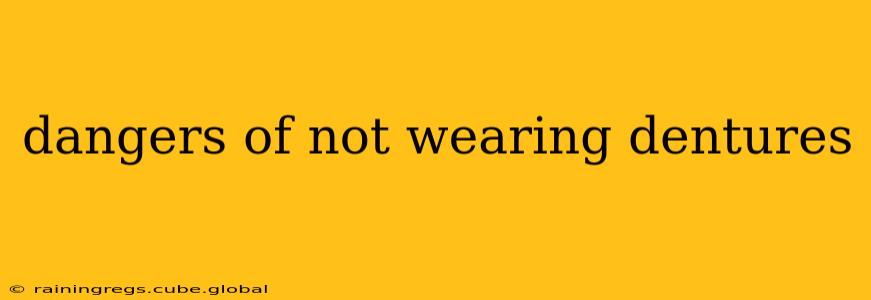Missing teeth can significantly impact your overall health and well-being. While some individuals may choose not to replace missing teeth with dentures, understanding the potential risks is crucial for making informed decisions about oral health. This comprehensive guide explores the various dangers associated with not wearing dentures after tooth loss.
What Happens if You Don't Wear Dentures?
The consequences of foregoing dentures after tooth extraction or significant tooth loss extend beyond mere aesthetics. The repercussions are multifaceted and can impact your physical and mental health.
What are the health risks of not wearing dentures?
This is a key question many people have. Not wearing dentures after tooth loss can lead to a cascade of negative consequences for your oral and overall health. These include:
-
Bone Loss (Resorption): This is perhaps the most significant danger. Your jawbone relies on the stimulation of tooth roots to maintain its density. When teeth are missing, the bone begins to resorb (break down), leading to a shrinking jawline, a sunken facial appearance, and potential difficulty with eating and speaking. The bone loss can even impact the structural integrity of your jaw, making you more prone to fractures.
-
Changes in Bite and Jaw Alignment: The absence of teeth can disrupt the natural alignment of your bite. This misalignment can strain your jaw joints (temporomandibular joints or TMJs), leading to pain, headaches, and clicking or popping sounds in your jaw.
-
Difficulties with Chewing and Eating: Eating becomes significantly more challenging without a full set of teeth. This can restrict your diet, leading to nutritional deficiencies and potential weight loss. It can also make it difficult to enjoy your favorite foods.
-
Speech Impairment: Teeth play a crucial role in pronunciation. Missing teeth can affect the clarity and sound of your speech, leading to mumbling or difficulty forming certain words.
-
Increased Risk of Gum Disease: The remaining teeth become more vulnerable to periodontal disease (gum disease) in the absence of supporting teeth. Food particles can accumulate more easily, leading to infection and potential tooth loss.
-
Psychological Impact: Many individuals experience a significant psychological impact from missing teeth, including feelings of self-consciousness, embarrassment, and low self-esteem. This can affect social interactions and overall quality of life.
-
Difficulty in maintaining proper oral hygiene: Without dentures, cleaning the mouth thoroughly might be more complicated, which can increase the risk of infections and gum diseases.
How can I prevent bone loss after tooth extraction?
Preventing bone loss after tooth extraction is crucial. While dentures are a primary solution, immediate placement of implants is often recommended to help maintain bone density. Regular dental checkups and adherence to recommended oral hygiene practices also play a significant role. Your dentist can discuss additional options and strategies tailored to your specific situation.
What are the long-term effects of not replacing missing teeth?
The long-term effects of not replacing missing teeth are cumulative and progressively worsen. Beyond the issues mentioned above, chronic jaw pain, significant facial changes, and severely compromised nutrition can impact your overall health and quality of life. It’s important to consult a dentist to discuss appropriate replacement options to mitigate these long-term risks.
Are there alternatives to dentures?
Yes, besides dentures, other options for replacing missing teeth include dental implants, bridges, and partial dentures. The best option depends on your individual needs and circumstances, and should be discussed with your dentist.
Conclusion
Choosing not to wear dentures after tooth loss can have far-reaching negative consequences. The risks to your oral health, physical well-being, and even your mental health are substantial. Regular dental checkups and discussions with your dentist about appropriate tooth replacement options are crucial for maintaining optimal oral health and overall quality of life. Don't hesitate to seek professional advice to understand the best course of action for your situation.
